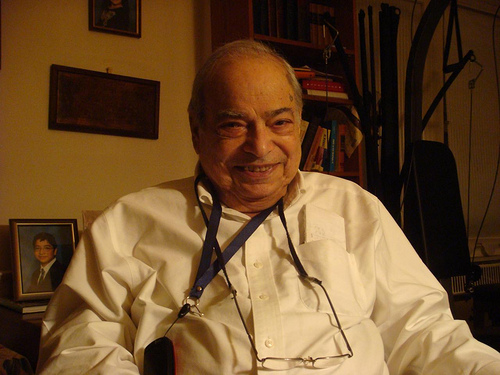PROBLEM OF IDENTITY OF A JEW FROM EGYPT
What Am I?
By Victor D. Sanua, Ph.D.
More than thirty years ago, I left Egypt to study psychology in the United States. I had been accepted for graduate work at Michigan State University. While I could speak English correctly, being a graduate of the American University at Cairo. I had a foreign accent. Most of the time people I met would ask me about my background. This put me somewhat in a dilemma, since a simple answer would not provide the required information. I would counter by asking what they meant by my background. If they referred to my place of birth, it was Egypt, but in the same breath I would add that I was not an Egyptian.
The next question, which was often raised, was the kind of passport I had, and the answer was that I had an Italian passport. But again I had to add that I had never lived for any length of time in Italy. I had simply inherited Italian citizenship from my father. The next inquiry would then be about my family origin. My reply would be that my family had originally lived in Spain, and had left that country in 1492 when the Jews were expelled. Subsequently, my ancestors settled in Leghorn, Italy. While at home we spoke Ladino, a kind of archaic Spanish that served as our mother tongue,. technically we could not consider ourselves Spaniards, despite the fact that my parents used to tell me "mosotros somos Espagnolis" ("we are Spaniards’).
Another question raised was where did I live during my formative years?. My reply was that I had spent eight years as a youngster in Belgium, but my parents never acquired Belgian citizenship. The next question might possibly be about the kind of education I had received. Here there was no doubt that my early education was purely French and that at times we felt more French than the French themselves. But certainly we could not claim any official affiliation with France. The last question may have been, where was my mother born? To this my answer was that she was born in Istanbul, Turkey. But my mother was not Turkish. By that time my interlocutors would give up, and, as a final remark of my own, I would add that the only thing I was sure of was that I was Jewish.
After I obtained my American citizenship, if the question was raised, I would add that I was an American citizen. Because of my particular background and problems of identity it may not be strange that my areas of research have been cross-cultural, with special emphasis on the Jews, the Arabs, and schizophrenia.
In this paper I wish to present some memories of a young Jew growing up in Cairo, Egypt. Many individuals have expressed interest in how a Jewish family would fare in Egypt between the two World Wars in view of the hostility it would encounter in a Muslim environment, and in the kind of life Jews led in a country that at the time was regarded as underdeveloped. To illustrate how little was known about Egypt, I recall showing an early picture of mine to a well-educated acquaintance. In the picture I was surrounded by trees.- My friend expressed surprise at seeing trees, since he had visualized Egypt as being a land of deserts. When I showed him another picture in which I was roller-skating, his puzzlement increased; such modern amenities in a backward country! In fact, Cairo had practically everything a major European capital would offer: an opera, symphony, concerts, horse racing, sports, fabulous nightclubs with elaborate shows. The most recent movies from France, Italy. and the United States were shown on Egyptian screens, the latter two with French subtitles. The latest fashions were displayed in Cairo stores.
I was born in a middle-class family which, as indicated above, was shaped by various cultural currents. Both my father and mother spoke Ladino, a medieval Spanish with many Hebrew words as well as French words with Spanish endings. There were no schools in this language for the young generation; it was learned at home.
My parents corresponded in Ladino written in Hebrew characters. Besides Ladino, the other language of communication was French. at home as well as outside the home. In most businesses French was the dominant language. While the French spoken by Jews in Egypt did not sound precisely like that spoken in Paris, it was nevertheless quite correct, and there were numerous newspapers and periodicals published in this language
Excerpts from Fields of Offerings Studies in honor of Raphael Patai, Victor D.Sanua Editor. Rutherford.NJ: Fairleigh Dickinson University Press, pp 263-295.

